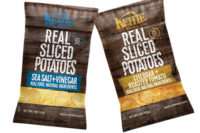Chicken Over Chips?
In August, Dr. Robert L. Wolke, professor emeritus of chemistry at the University of Pittsburgh, wrote an article for The Washington Post in which he said he had just tossed half a bag of potato chips because he is afraid of getting cancer. The headline read, “Chicken Over Chips.”
In the article, Wolke — who is hyping his latest book, “What Einstein Told His Cook 2: The Sequel: Further Adventures in Kitchen Science” — said he was giving up potato chips, which he admittedly loves, because of the chemical acrylamide. He also noted that acrylamide, a probable carcinogen, has been found in fried starch foods, especially potato chips and French fries.
“With all the cancer-from-food alarms the media thrust upon us almost every day, it’s getting hard to avoid the impression that just living causes cancer,” he wrote. “And maybe it does. Are eating and breathing perhaps the most dangerous things we can do?”
Wolke said he has “never been one to perform the Chicken Little dance every time a new food hazard hits the headlines.” He acknowledged that a “risk is only a risk — a statistical probability, not a certainty.” But he noted that the amount of the substance consumed when considering such factors as acrylamide is a crucial factor.
But then, Wolke added, “It is only prudent to reduce our risks as much as possible,” like he did when he quit smoking. So, he said, he’s switched to peanuts instead of eating chips, just to be on the safe side.
Setting the Record Straight
At the Snack Food Association, nutritionist Lisa Katic, the SFA’s health policy advisor, decided to respond to Wolke’s article. Katic has been staying abreast of acrylamide concerns and scientific studies that have been done regarding them, as well as actions by such governmental entities as the Food and Drug Administration and the World Health Organization.
“Hopefully, Lisa’s letter will alleviate Dr. Wolke’s concerns, and he can enjoy his potato chips once again,” said SFA president and CEO Jim McCarthy. “It’s nice that he’s eating peanuts, but there’s no need to give up his chips.”
In her Sept. 1 letter to Wolke, who ironically is affiliated with her alma mater, Katic said that if he is going to stop eating potato chips because of acrylamide, then what about breakfast cereals, brewed coffee, soft bread, bagels and soup mixes where levels of acrylamide also are present?
“It is inappropriate to single out one food and suggest the elimination of our product without regard to those, which may be more frequently consumed,” Katic said.
She pointed out that the 2006 Exposure Assessment of Acrylamide conducted by the Food & Drug Administration indicated that 100% of the population consumes acrylamide as part of its diet. She added that the World Health Organization advises consumers not to change their dietary choices, but to follow established guidelines and eat a well-balanced diet consisting of a wide variety of foods.
“As you know,” Katic wrote, “a recent report by the WHO and the Food and Agriculture organization Joint Expert Committee on Food Additives examined available scientific information to assist national governments in better understanding what is known about acrylamide toxicology and how to evaluate potential ways to reduce acrylamide concentrations in food.”
She went on to say that the committee’s report recommends that acrylamide continue to be reevaluated when the results from ongoing toxicological studies are available.
“Further research is needed before any solid recommendation to industry and consumers can be made regarding reducing levels of acrylamide in food,” Katic said.
“There are snacks in supermarkets to meet every nutritional and/or taste preference,” Katic stressed, adding that SFA members manufacture potato chips, tortilla chips, pretzels, popcorn, crackers, meat snacks, pork rinds, nuts and other savory snacks.
Katic enclosed for Wolke a copy of the SFA’s “Snacks Fit, Choose Balance” brochure which illustrates how snacks can be part of a healthy diet.



